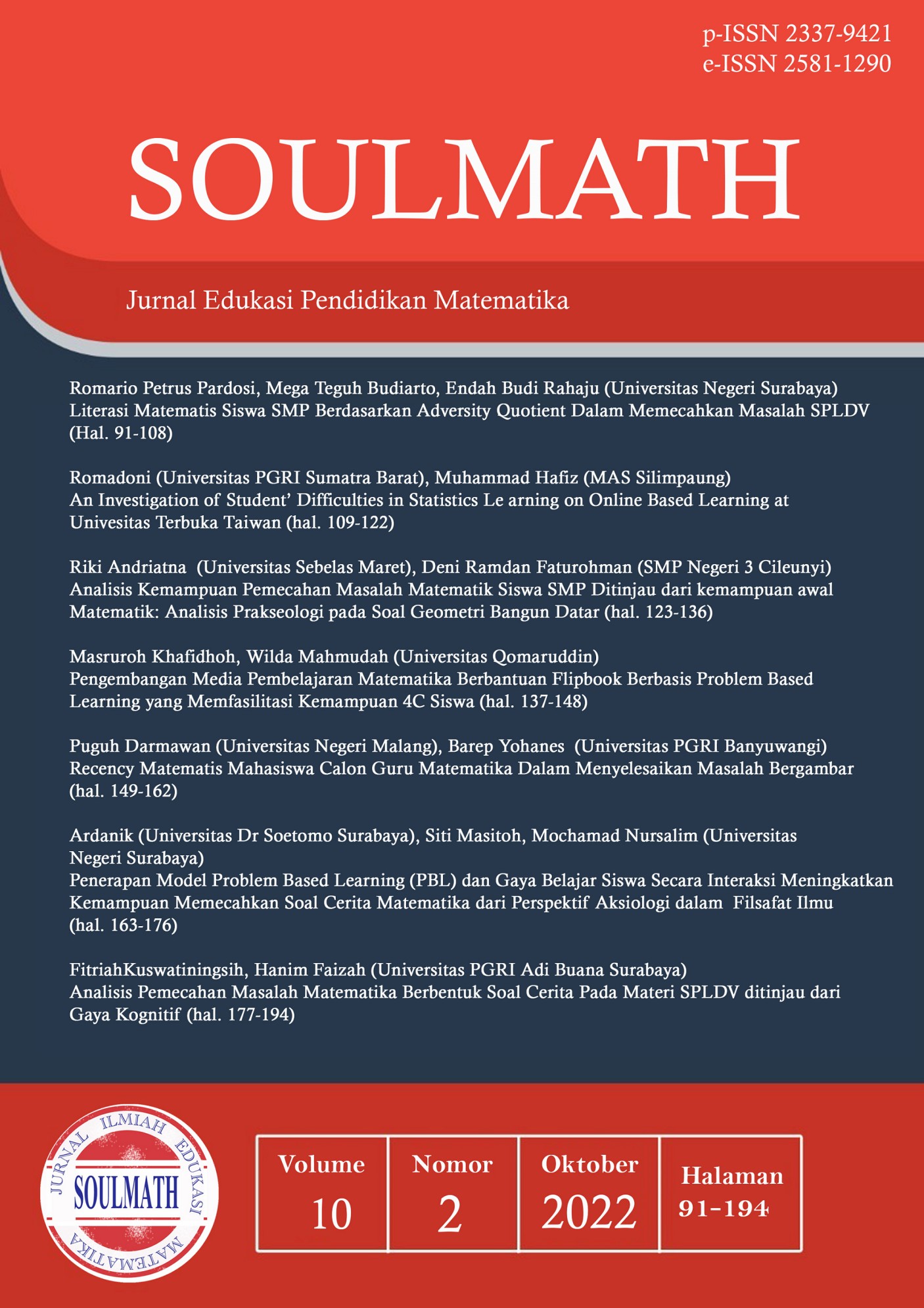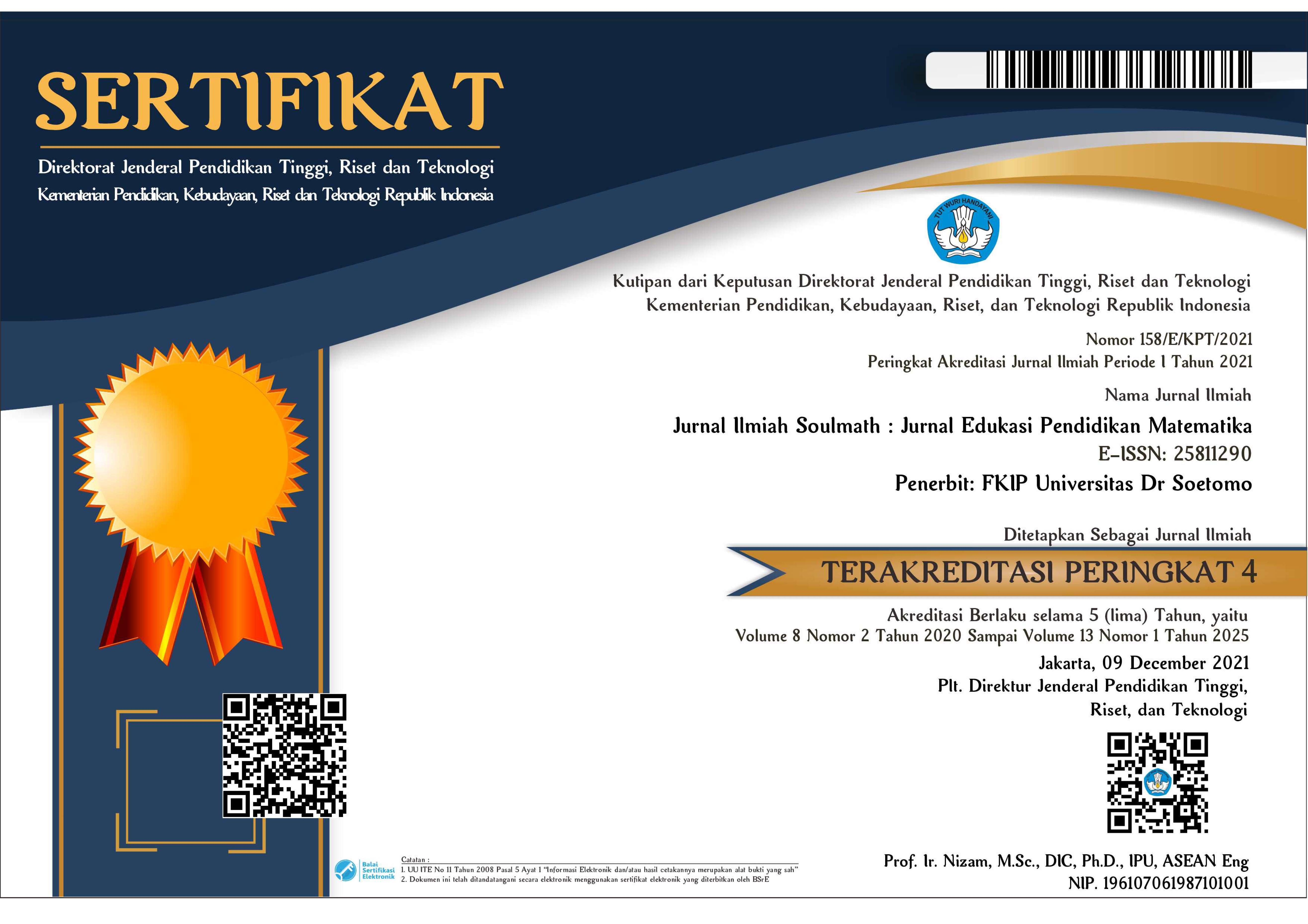Penerapan Model Problem Based Learning (PBL) dan Gaya Belajar Siswa Secara Interaksi Meningkatkan Kemampuan Memecahkan Soal Cerita Matematika dari Perspektif Aksiologi dalam Filsafat Ilmu
 Abstract views: 299
,
Abstract views: 299
,
 5199 Publish (Bahasa Indonesia) downloads: 205
5199 Publish (Bahasa Indonesia) downloads: 205
Abstract
The concept of axiology in the philosophy of science, namely the implementation of knowledge that has been learned from mathematics, turns out to have enormous benefits for everyone, especially in efforts to solve cases related to real life which are applied in the form of mathematical story problems through the PBL model. The purpose of this study was to prove: (1) students' ability to solve word problems based on learning styles; (2) students' ability to solve word problems between those implementing the conventional model and the PBL model; (3) the effect of interaction between learning models and learning styles on students' ability to solve word problems. This research is based on quantitative with experimental type. This experiment was conducted by the same teacher on a system of three variable linear equations, 90 minute sessions twice a week for three weeks. Class X-1 and class X-3 as research samples. The data collection method used a 5-item essay test and a learning style questionnaire. Hypothesis testing is processed using Two-Way Anova. The results showed (1) there was a very significant difference in the ability to solve word problems based on students' learning styles (visual, auditory, and kinesthetic); 2) there is a significant difference in the ability to solve word problems between those who apply the conventional model and the PBL model; 3) there is an interaction effect between learning styles and learning models that is significant on the ability to solve word problems in class X SMA Dr.Soetomo Surabaya.
Keywords: Learning Style, Problem Based Learning (PBL), Math Story Problems
Downloads
References
Andanik, R. T., & Fitrianawati, M. (2018). Pengaruh Keterampilan Membaca Pemahaman terhadap Kemampuan Pemecahan Soal Cerita Matematika Peserta Didik Kelas V Sekolah Dasar. Jurnal Fundamental Pendidikan Dasar, 2(2), 40.
Anggraini, V. D., Mukhadis, A., & Muladi. (2013). Problem Based Learning, Motivasi Belajar, Kemampuan Awal, Hasil Belajar Siswa SMK. Jurnal Ilmu Pendidikan, 19(2), 187–195.
Atmaja, I. M. D. (2020). Filsafat Ilmu Sebagai Pembentuk Karakteristik Pengembangan Media Pembelajaran Matematika. Jurnal Santiaji Pendidikan (JSP), 10(1).
Bire, A. L., Geradus, U., & Bire, J. (2014). Pengaruh gaya belajar visual, auditorial, dan kinestetik terhadap prestasi belajar siswa. Jurnal Kependidikan: Penelitian Inovasi Pembelajaran, 44(2).
Cohen, L., Manion, L., & Morrison, K. (2007). Research Methods in Education Research Methods in Education. The Taylor & Francis e-Library. https://doi.org/10.1111/j.1467-8527.2007.00388_4.x.
DePorter, B. (2007). Quantum Learning: Membiasakan Belajar Nyaman dan Menyenangkan.
Didartita, D., & Irwandi, I. (2019). Pengaruh Gaya Belajar pada Pembelajaran Kooperatif terhadap Hasil Belajar Siswa SMP Negeri 38 Seluma. In Seminar Nasional Sains & Entrepreneurship (Volume 1, Nomor 1).
Efendi, A., Fatimah, C., Parinata, D., & Ulfa, M. (2021). Pemahaman Gen Z Terhadap Sejarah Matematika. Jurnal Pendidikan Matematika Universitas Lampung, 9(2), 116-126.
Fadly, A. (2012). Peningkatan aktivitas dan hasil belajar siswa melalui model pembelajaran Problem Based Learning (PBL)(studi pada kelas X bisnis dan manajemen pada mata pelajaran kewirausahaan di SMK Arjuna 1 Malang) (Doctoral dissertation, Universitas Negeri Malang).
Fakhriyah, F. (2014). Application of Problem Based Learning in Developing Students' Critical Thinking Ability. Journal of Indonesian Science Education, 3(1), 95-101.
Hartati, L. (2015). Pengaruh gaya belajar dan sikap siswa pada pelajaran matematika terhadap hasil belajar matematika. Formatif: Jurnal Ilmiah Pendidikan MIPA, 3(3).
Kurniawan, H., & Susanti, E. (2021). Pembelajaran Matematika Dengan STEM (Science, Technology, Engineering, Mathematic). Deepublish.
Kodariyati, L., & Astuti, B. (2016). Pengaruh Model PBL Terhadap Kemampuan Komunikasi Dan Pemecahan Masalah Matematika Siswa Kelas V SD. Jurnal Prima Edukasia, 4(1), 93–106.
Lukitasari, D. T., Sudarmiatin, S., & Zainuddin, M. (2019). Perbedaan Model Problem Based Learning dan Konvensional terhadap Keterampilan Berpikir Kritis Siswa. Jurnal Pendidikan: Teori, Penelitian, dan Pengembangan, 4(8), 1125-1131.
Marliani, M. (2021). Matematika dalam Aksiologi. Tunas: Jurnal Pendidikan Guru Sekolah Dasar, 7(1), 26-31.
Sidabutar, R. (2018). Hasil Belajar Matematika Siswa Ditinjau dari Kebiasaan Belajar dan Lingkungan Belajar. Jurnal Pendidikan, 19(2), 98-108.
Sinaga, W., Parhusip, H., Tarigan, R. & Sitepu, S. (2021). Perkembangan Matematika dalam Filsafat dan Aliran Formalisme yang Terkandung dalam Filsafat Matematika. Journal Of Mathematics Education And Applied.2(2), E-ISSN: 2686-4452.
Sofyan, H., & Komariah, K. (2016). Pembelajaran Problem Based Learning dalam Implementasi Kurikulum 2013 di SMK. Jurnal Pendidikan Vokasi, 6(3), 260. https://doi.org/10.21831/jpv.v6i3.11275
Susdarwono, E. T. (2020). Analisis Varian Sederhana dan Uji-Scheffe dalam Penelitian Eksperimen Pengajaran Matematika Melalui Pemahaman Filsafat Matematika. Vygotsky: Jurnal Pendidikan Matematika dan Matematika, 2(2), 90-101.
Tafsir Ahmad. 2017. Filsafat Ilmu, Bandung: Rosdakarya.
Utami, Y. P., & Ulfa, M. (2021). Pemahaman Mahasiswa Pendidikan Matematika pada Perkuliahan Daring Filsafat & Sejarah Matematika. Mathema:Jurnal Pendidikan Matematika, 3(2), 82-89.
Yanti, A. H. (2017). Penerapan model problem based learning (PBL) terhadap kemampuan komunikasi dan kemampuan pemecahan masalah matematika siswa sekolah menengah pertama Lubuklinggau. Jurnal Pendidikan Matematika Raflesia, 2(2).
Yunia, N., & Zanthy, L. S. (2020). Kesalahan siswa smp dalam menyelesaikan soal cerita pada materi aritmatika sosial. Teorema: Teori Dan Riset Matematika, 5(1), 105-116.







